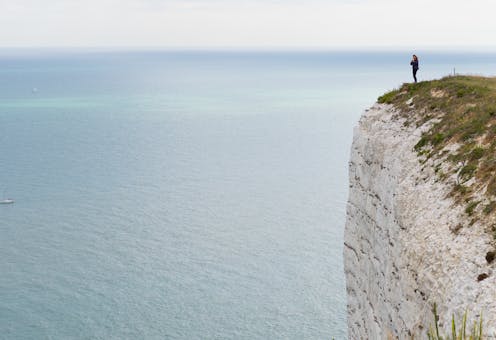
UK foreign policy has long been shaped by a particular geopolitical way of conceiving the nation’s place in the world. This island identity may have been forged in imperial times, but it remains hugely relevant in the post-Brexit world.
In order to explain and justify its colossal empire – the largest the world has ever seen – imperial thinkers and politicians depicted the UK as a remarkable little island that was not only capable of running such a huge operation, but was positively made for the role.
Its advantageous location in the North Atlantic, close to Europe but not entangled with it, gave it an eagle eye on world affairs. What’s more, the oceanic space that Britain inhabited meant that it was a fundamentally more mobile polity than other landlocked states. In the imperial imagination, Calcutta was as close as Calais, Darwin as near as Dublin.
In my book Geopolitics and Identity in British Foreign Policy Discourse: the Island Race, I explain how these habits of mind have remained important for UK politicians, even as the empire dwindled. To be an island was to be democratic, sovereign, freedom-loving, mobile and a bastion of limitless and global free trade.
Your sovereign neighbour
After the then French president Charles de Gaulle vetoed British membership of the European Economic Community in 1963, the House of Commons was defiant: the UK had a bright enough future separate from the continent. Even Edward Heath, the prime minister who eventually led the UK into the European Community, told the Conservative conference in 1973 that “we are an island race”.
The Falklands Conflict provided ample opportunity for Margaret Thatcher to restate a powerful island identity that she felt was becoming lost. Tony Blair didn’t just embrace globalisation as a post-cold war explanatory concept, he depicted a UK that was ideally suited for this new arena of distanceless flows and networks.
These impulses to define the UK as a sovereign, mobile, freedom-loving island helped politicians to navigate the huge changes that occurred since 1945. It should therefore come as little surprise that they have remained potent in this Brexit era.
Certainly, David Cameron’s starting-gun speech in 2013 remains a startling document, not least for his lengthy exposition of how deeply the UK being an island has shaped its history and psychology.
Never more than lukewarm about Brexit, “Global Britain” was Theresa May’s attempt to name the UK’s posture after leaving the EU. It suggests that the only two choices for the UK’s foreign policy are: Europe or the whole wide world. Indeed, these were the contours of many 1960s debates on European integration.
For Global Britain to function as a concept, it relies on notions of British reach and mobility that hearken back to its maritime imperial heyday rather than accurately describing its present situation. The historically inclined Boris Johnson embraced the concept. But in many ways, Global Britain is not about the present so much as the past and the future.
Nostalgic politicians (usually Conservative) could summon the remarkable little island and its empire; free-trade Brexiteers could point to bountiful futures of trade agreements. Both groups could point to histories of and aspirations towards being buccaneers of free trade, nimbly spanning the oceans to bring prosperity and democracy to the world. For Global Britain enthusiasts, the world remains a space without distance, ready for maritime exploitation.
This also informs the more recent “Indo-Pacific tilt”, in which the UK looks to become a strategic player in the vast and varied region spanning both Indian and Pacific Oceans. How much clout the UK actually has here is highly debatable, but the Aukus pact, the new defence agreement with Japan and the Comprehensive and Progressive Agreement for Trans-Pacific Partnership at least demonstrates ambition.
What is an island in the 21st century?
As the UK looks to define a new place and role for itself in the world outside of the EU, it is falling back on time-honoured notions of island identity. Yet there is far less unity about what it means to be an island in this fractious 21st century than there was during the imperial era.
The debates about how to enact Brexit have been marked by profound disagreements over whether the UK’s relatively small size is advantageous or the opposite; whether the UK, as an offshore island, should engage closely with the rest of Europe or disconnect; and whether and how much the UK could look to be embraced by the rest of the world, especially its “kith and kin” of the Commonwealth.
Although the prospect of Scottish independence looks to have receded since its Nicola Sturgeon-era high watermark, the SNP’s strident articulations of Scotland as a European, Celtic or even quasi-Scandinavian country represents a fundamental challenge to the often unifying concept of British islandness. This is to say nothing of Northern Ireland.
Many historians have argued that the empire provided the glue between the constituent parts of the UK. Without the empire or the EU, are we now seeing the true nature of a disunited Kingdom? Perhaps Britishness is just a fig leaf for English nationalism. This would certainly explain the renewed importance of island identity to unionist politicians as they seek to define not just the UK’s place in the world, but its very future as a union.
Nick Whittaker ne travaille pas, ne conseille pas, ne possède pas de parts, ne reçoit pas de fonds d'une organisation qui pourrait tirer profit de cet article, et n'a déclaré aucune autre affiliation que son organisme de recherche.
This article was originally published on The Conversation. Read the original article.







